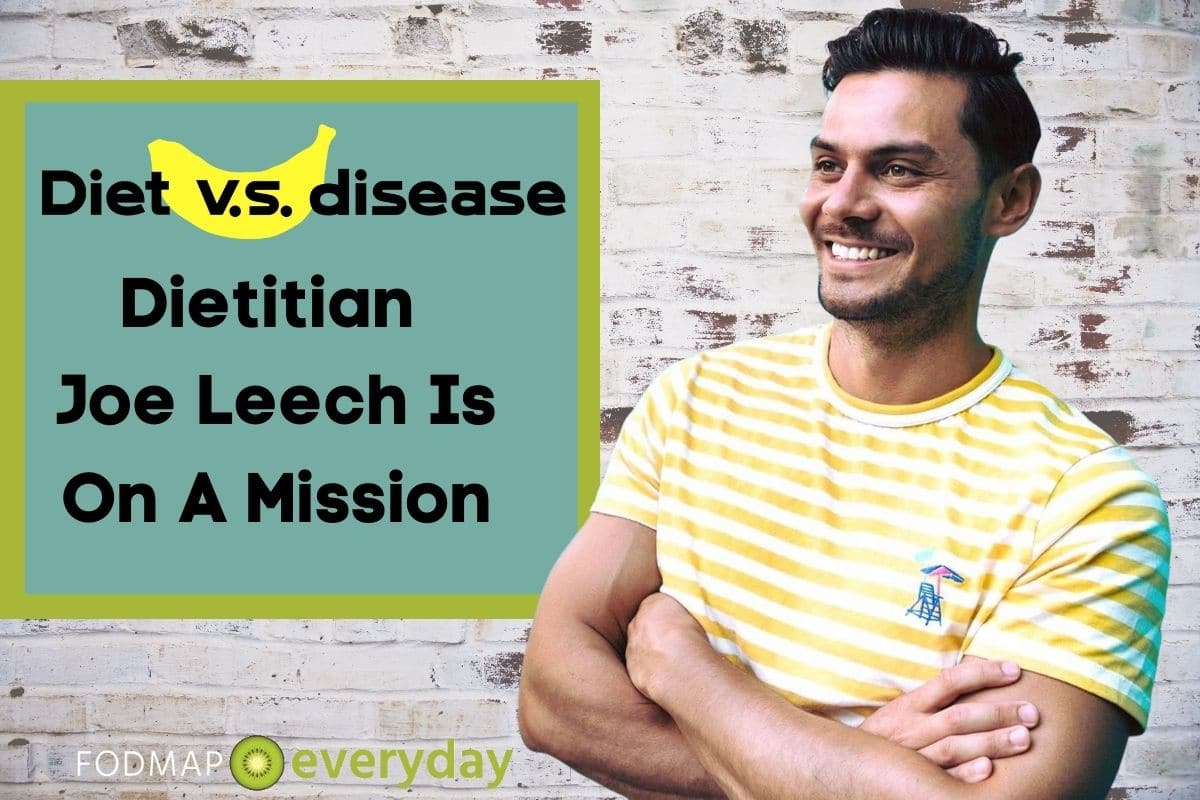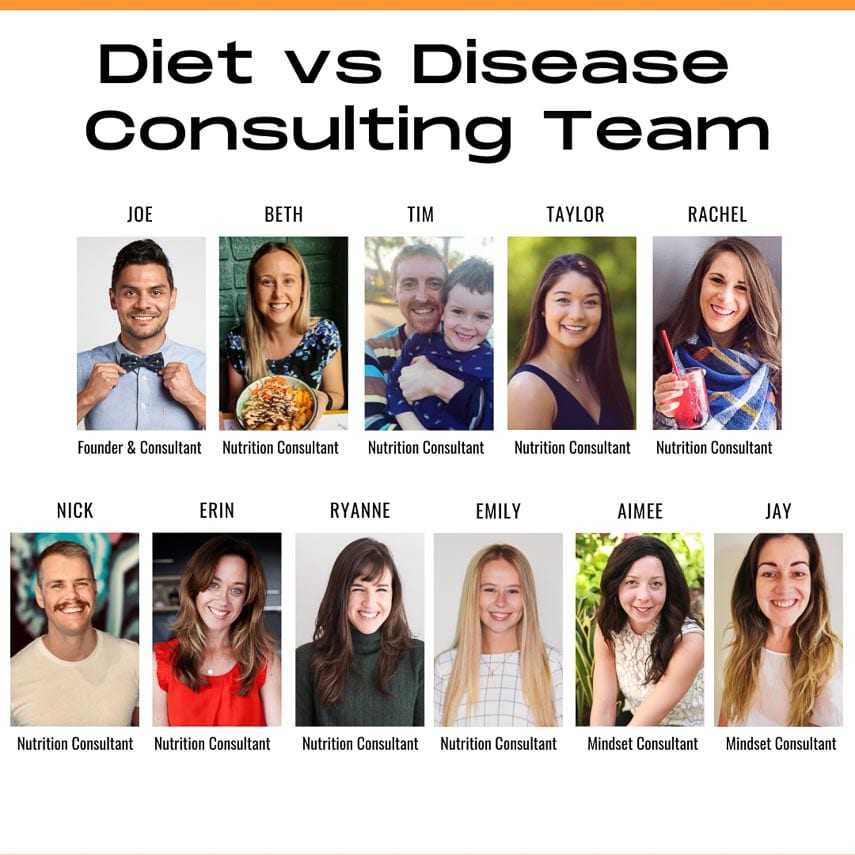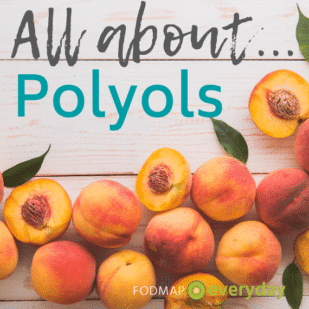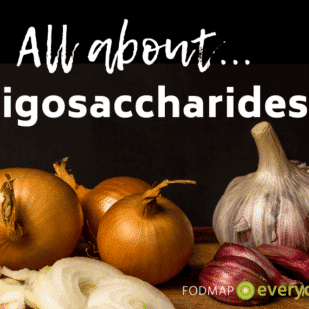Meet Joe Leech
Australian based dietitian Joe Leech (MSc Nutrition and Dietetics) runs the vibrant website, Diet vs. Disease, where you will find evidence-based information on weight loss, hypothyroidism, auto-immune issues, supplement reviews, meals plans and of course information on the low FODMAP diet.

Joe has a team of dietitians – many of them Monash University trained – and loads of videos with straight talk on what you need to know about your digestive system and health in general.
After he obtained his Master’s degree in Nutrition and Dietetics from the University of Wollongong in 2011, completing his thesis in Finland, he worked privately as well as in clinical settings focusing on food intolerance, autoimmune diseases and metabolic health issues. Joe has also created hundreds of YouTube videos, which have over 5 million views, for Healthline.com’s Authority Nutrition channel.
Luckily for all of us Joe now offers nutrition coaching and consulting to clients around the world, and we want to introduce you to him, his team, and his brand.
Grab Your Seat For The 14 Day Digestive Health Reboot For Only $29!
A Rare Male Bird In A Flock Of Female Dietitians
Dédé Wilson: Joe, this is so great that we are finally getting together. We had reached out to you way back when we first launched, because we knew that you had great things to offer the low FODMAP community. First of all, you are a man in the RD world – which is not as common as it should be! What drew you to become a dietitian in the first place?
Yes, “guytitians” are quite a rarity! I was studying exercise science and realized at the time that I was particularly interested in food chemistry and optimizing nutrition for sport. This resulted in me swapping to a dietetics degree.
Let’s start with your FODMAP tools, since FODMAPs are our focus. Your website covers many digestive issues but tell us about how you first became aware of the low FODMAP diet and how you knew that you had something to offer those in need.
Studying dietetics in Australia, we actually were taught about the low FODMAP diet during our degree, which is where I first became aware of it. And this was way back in the late 2000s when Monash University (Melbourne) were first publishing their data and findings.
After working in hospitals and also a private practice for several years, it became clear there were many flaws in the way dietitian services were delivered in the traditional capacity. This was particularly true of diet protocols that take time, such as a low FODMAP diet. This was one of the catalysts behind why I created the Diet vs. Disease consulting service.
Unlike many other resources, you have built up a very robust network of offerings including videos, webinars, meal plans and more. Tell us what someone will find when they come to your site. Let’s say I am someone suffering with IBS, have heard about the low FODMAP diet, don’t know where to start and I need help.
As a new reader you can start with this post titled Low FODMAP Diet: The D.I.Y Beginner’s Guide .
If you are someone looking for help, maybe to get clarity on how to start, or somewhere all the resources you will need are in one place and conveniently set out for you, I recommend you start with our 14-Day Digestive Health Reboot. It’s a low-cost online program, very much DIY. (Read more about the Reboot at the end of this interview.)
Building The Right Tools For Self Care
We love that you have created an entire system that can be self-directed. If there is one thing we have learned it is that one-size does not fit all, whether we are talking about an actual approach to diet, or, in this case, even how one approaches and utilizes tools.
If you are looking for individualized help, perhaps you have tried to resolve your issues on your own before and it didn’t work, or you feel your case is complex, or you just want to sort this all out and get on with your life as fast as possible, then I recommend our one-to-one consulting service.
Do you suggest your webinars as the best way for people to initially learn about your offerings?
Yes! I recommend to watch the video in this link, which outlines how our service is completely unique and different than anything else on the market.
Helping Over 10,000 Clients Get Relief From IBS
Robin and I were so impressed with this video and page. Folks reading this interview should know that you have helped over 10,000 clients regain their gut health, with over 1,000 remotely and online. Via the link above they can view numerous testimonials, and they are as impressive as they are touching. You and your team are truly changing lives.
You also mention in the video that you have anxiety-driven IBS. Tell us more about that. Stress and anxiety is, unfortunately, well known to many of us, your co-sufferers.
This is something I started to experience when running a business, ironically. I think it’s a combination of over-working + adulting (or trying to).
Fortunately I have this mostly under control now (aside from the occasional episode) since learning how to manage that sensitivity through gut-directed therapy, which research shows is equally as effective as a low FODMAP diet in individuals where anxiety is a major trigger.
In fact, the direct relationship between stress/anxiety and digestive issues (the gut-brain axis) was so common in our clients that our consulting service now includes gut-directed therapy either with an app or by a specialist on our team, in addition to our nutrition guidance of course.
Meet the Team
Can you tell us more about your personal one-on-one coaching? And how do folks get to work with you personally, or does your team of RDs come into play?
Actually I now have an amazing team of Dietitians and other experts around the world so that we can provide the absolute best quality service to clients, 24 hours a day, 7 days a week. You can read more about the team here.
And this is a graphic of the team right now:

So your entire team is comprised of dietitians? I know that the U.S. and Australia, for instance, use different terminology to denote training. In the U.S. we caution folks from using “nutritionists”, since the term is very loosely defined, whereas dietitians have the kind of training and credentialing that we trust. Can you elaborate a bit more about your team’s credentials?
Yes I agree with that caution. My understanding is that anyone can legally say they are a nutritionist, it’s not a regulated term and doesn’t really mean anything.
Our team of nutrition consultants that actively work with clients are all university-trained Dietitians in their respective countries (USA, Australia, Canada). For example, the US Dietitians are RDs, the Australians are APDs.
Global Services Available
Who are your clients? Are they mostly Australian based, or spread around the globe? We have seen more and more women in their 60s and into their 90s tell us that they are finally finding relief with the diet. It is just heartbreaking to know so many people are in pain and don’t know what to do.
Although I am Australian, our typical clients are a mix between US, Australia, Canada and Europe. It’s mostly US clients just because they are the biggest population.
And yes as you have noted, the average age range of our ladies are 60-85 years young! They have lived with digestive issues for a large part of their lives and have made it a priority to resolve now.
Grab Your Seat For The 14 Day Digestive Health Reboot For Only $29!
Navigating the Challenges of The Low FODMAP Diet
What have you found to be the biggest sticking points for those following the diet? And how do you help folks with your tools and resources get over those hurdles?
Two areas are particularly tricky for those who try to navigate the diet on their own. The first is that you need to be comfortable in your knowledge of FODMAP stacking and when they deplete back to baseline, like monitoring your GOS quantities, sorbitol, etc.
So, to drill this down, by baseline you mean that enough time has passed (usually about 3 to 4 hours between meals). In other words, if you eat the same FODMAP at breakfast and then at lunch that enough time has transpired so that one has not stacked FODMAPs, right?
Yes, basically stacking is when we consume the same FODMAPs (for example GOS) at consecutive meals or within a few hours, even if we consumed it in low FODMAP quantities. This frequent exposure to a FODMAP means it can “stack up” in your digestive system and can cause symptoms.
So it’s beneficial to be able to easily recognize what FODMAPs are in your meals so that you can minimize FODMAP stacking.
The second tricky part is the reintroduction phase and being comfortable to implement the correct protocol, for example the washout days, and splitting fructans based on composition. This is one of the many reasons we have our one-to-one service. things like that?
Can you explain what you mean by washout days? And also, maybe detail how you and your teams suggest splitting various fructan-rich foods into separate challenges.
Washout days refers to certain days in our reintroduction protocol where there are no FODMAP compounds challenged (tested).
Essentially when reintroducing FODMAP compounds we want each challenge to start on a ‘clean slate’, where there is a minimal likelihood of FODMAP stacking within the digestive system. Washout days help us to do this.
Fructans are a tricky one because within the family of fructans there are three main categories: inulin type (such as garlic and onion), graminan type (wheat fructans) and levan type. There are varying levels of these in foods which is why we test multiple foods for fructans.
Joe’s Elevator Pitch
Well, I love how you are such a straight shooter. No fluff; all evidence based articles. And your “Elevator Pitch” FODMAP explanation! Love it. For those not in the entrepreneurial world, please explain what an elevator pitch is and how us FODMAPers can use this approach to help others understand what we are going through.
The term “elevator pitch” refers to the ability to make a clear and concise statement in just a few sentences. In business, if you were to step into the elevator with someone you should be able to succinctly pitch what your business does before the elevator doors open again.
With regards to following a low FODMAP diet, I’ve made an “elevator explanation” that you can use as a default reply since it can be very frustrating to explain yourself every time you are eating out or at a friend’s place.
This is it:
“FODMAP is an acronym that refers to certain sugars known to trigger IBS. Eating a diet low in these sugars helps control symptoms, and it’s been incredibly beneficial for me.”
That’s it. You don’t need to say anything more. Some may ask for more details if they are interested, however for the most part people will not ask further.
The Hunger Project: Doing Good Beyond Borders
Now, this has nothing to do with FODMAPs, but tell us about your involvement with The Hunger Project.
I was fortunate enough to fundraise and travel to Uganda in 2017 with THP Australia to observe how donors’ money is spent, and to speak with those on the ground who are making things happen.
I actually made a video documentary about my time in Uganda.
We have donated 5% of ad revenue on the website and $1 of every sale of the 14-Day Digestive Health Reboot to THP since 2017.
Joe, You are doing so much great work – in and out of the FODMAP community. I know our community will get a lot out of this interview. You offer so many tools and opportunities for helping IBS sufferers succeed with the low FODMAP diet. And we always recommend working with dietitians to have the most direct road to success and a better relationship with food – without triggers. Thank you for your time.
Check Out Joe’s 14-Day Digestive Health Reboot!
We review and screen our offerings carefully and believe that you will be hard pressed to find a better online/remote gut health support program anywhere.
One Time Charge of $29 – Lifetime Access! No Contract. No Hidden Fees. 30-Day Money Back Guarantee!
Find out for yourself!
Click Here To Learn More!








